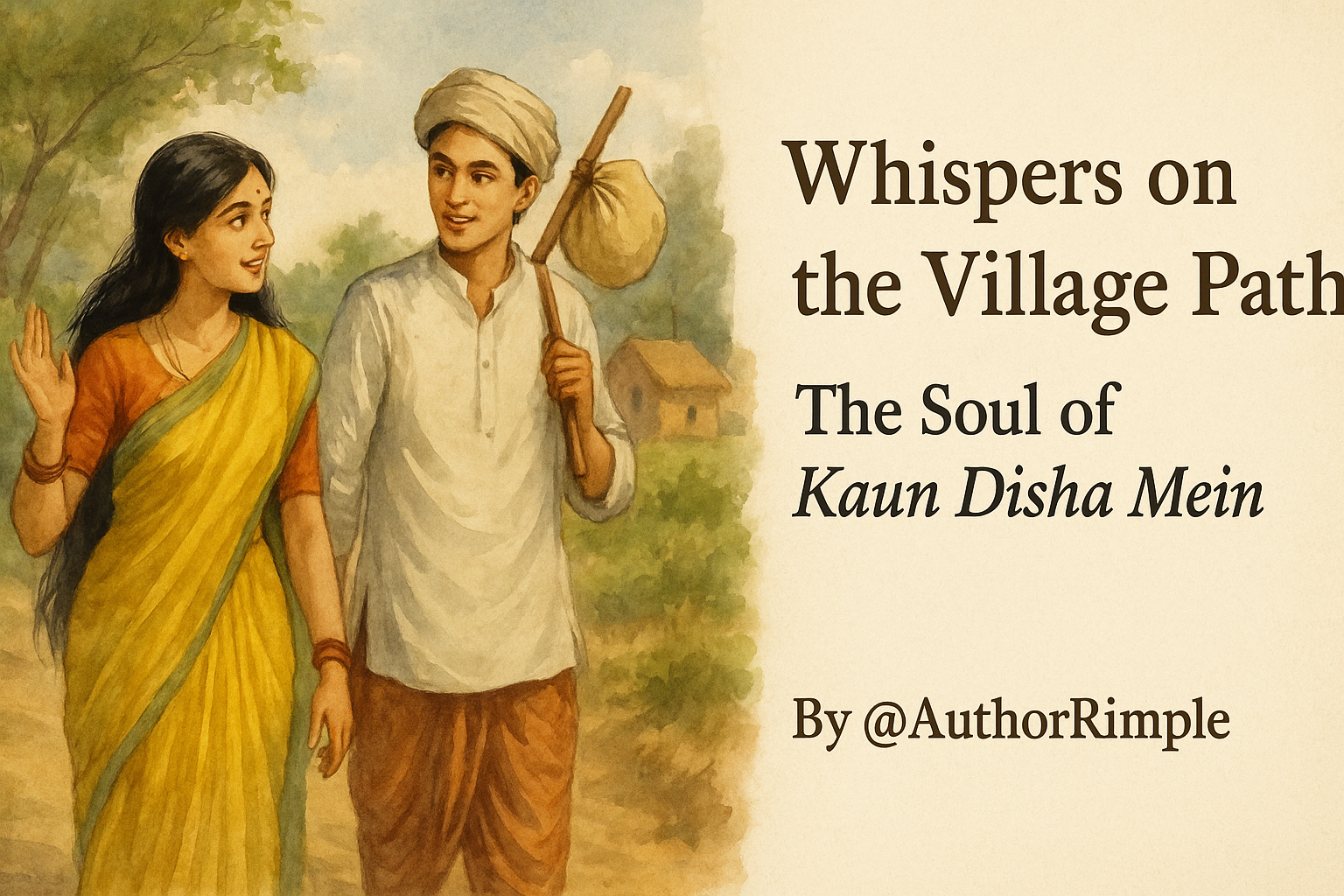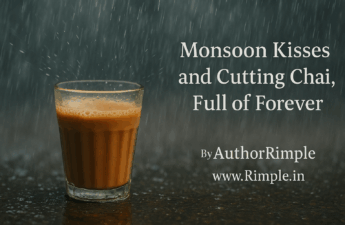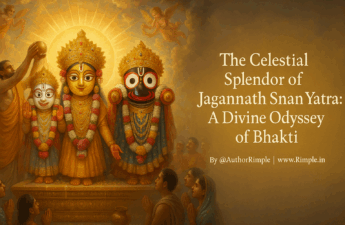The song Kaun Disha Mein Leke Chala Re Batuhiya from Nadiya Ke Paar (1982), sung by Jaspal Singh and Hemlata with Ravindra Jain’s soulful lyrics and folk melody, is a tender duet that captures the playful, innocent budding of a connection between Gunja and Chandan, the film’s protagonists. Set on a rustic village path, it weaves a story of two young hearts on a journey—literal and emotional—through teasing banter, shy glances, and heartfelt curiosity. Its beauty lies in its simplicity, its charm in the lighthearted push-and-pull of their growing bond, and its timelessness in celebrating love’s purity. Below, I weave the essence of each verse, highlighting the innocence, playfulness, lyrical grace, and cultural values that make this song a treasure.
The Song’s Soul: A Path of Playful Innocence
The song begins with Gunja’s soft, curious voice: “Kaun disha mein leke chala re batuhiya?” (“Which direction are you taking me, traveler?”). The question is a melody in itself, light and lilting, as if she’s half-wondering, half-teasing Chandan, her guide on this journey. Batuhiya, a tender rural term for a wayfarer, feels like a nickname, warm and familiar despite their new acquaintance. Repeated like a gentle refrain, it sets the stage for a journey not just across village paths but into each other’s hearts. The simplicity here is enchanting—no grand promises, just a girl’s curiosity about where this stranger, Chandan, is leading her.
Gunja’s plea, “E thehar thehar, yeh suhaani si dagar, zara dekhan de” (“Wait, this lovely path, let me see it”), is a burst of childlike wonder. The dagar (path) is suhaani—beautiful, alive with the charm of rural life—and she wants to pause, to soak in its magic. It’s as if the path mirrors her heart, alive with new feelings she’s just beginning to understand.
Chandan’s reply, “Kahin gaye jo thehar, din jayega guzar, gaadi haakan de” (“If you stop, the day will pass, keep moving”), is a gentle nudge, practical but laced with humor. Their exchange is a playful dance—her urging to linger, him teasing her to move on—like two friends tossing pebbles into a stream, each ripple a smile. The innocence shines in their light banter, free of any boldness, just pure, joyful connection.
Gunja sings, “Man bharmaaye naina baandhe yeh dagariya” (“This path bewilders my heart, binds my eyes”), her words painting a picture of enchantment. The dagariya (little path) isn’t just earth and dust; it’s a spell, weaving dreams in her soul, her eyes caught not just by the scenery but by Chandan’s presence. This line is lyrical poetry, simple yet profound, capturing the flutter of youth and attraction without a hint of impropriety. It’s the song’s magic—turning a walk into a moment of wonder, innocent and untouched.
Strangers Blossoming into Companions
The second verse deepens their bond: “Pehali baar hum nikale hain ghar se, kisi anjaane ke sang ho” (“For the first time, I’ve left home with a stranger”). Gunja’s voice carries a mix of thrill and shyness, as if stepping out with Chandan is an adventure, bold yet bashful in their rural world. Leaving home with an anjaana (stranger) is a leap, but the song keeps it pure, her courage wrapped in modesty.
Chandan responds, “Anjaane se pehchaan badhegi toh, mehak uthega tora ang ho” (“As familiarity grows, your being will bloom like fragrance”). His words are a gentle promise, mehak (fragrance) a poetic stand-in for the warmth of connection. Love here is subtle, like a flower opening to the sun, not loud or demanding.
Gunja teases back, “Mahak se tu kahin behak na jaana” (“Don’t let this fragrance lead you astray”), her tone playful, a mock warning to keep him in line.
Chandan retorts, “Na karana mohe tang ho, tang karne ka tose naata hai guzariya” (“Don’t trouble me, teasing is your habit, oh traveler”). His use of guzariya (passerby) mirrors her batuhiya, a playful echo that ties them closer. Their banter is the song’s heartbeat—light, flirtatious, yet chaste, like children chasing each other through fields. The innocence lies in their teasing, a game of words that builds trust without crossing boundaries, making every listener smile at its purity.
Names and the Warmth of Belonging
The third verse brings a tender intimacy of names and the warmth of growing closer. Gunja’s voice, soft and curious, begins: “Kitni door abhi, kitni door hai, yeh Chandan tora gaanv ho” (“How far is it, how far, Chandan, to your village?”). Her words are a gentle reach toward him, calling him by name—Chandan—a personal, almost shy gesture in their rural world. The village isn’t just a destination; it’s a dream, a quiet hope for a shared future, her heart wondering where this journey with him might lead. Her tone is playful yet earnest, like a breeze carrying a question she’s only beginning to understand. The innocence here is in her simplicity—she’s not demanding answers, just imagining a place tied to him, her curiosity as pure as a child’s.
Chandan responds, his voice warm with a hint of teasing: “Kitna apana lagane lage, jab koi bulaaye naam ho” (“How close it feels when someone calls your name”). These lines glow with the magic of recognition. In a village, a name is a bridge, a moment of belonging, and Chandan’s delight in saying “Gunja” is a quiet confession of affection. He’s noticing how her name on his lips feels like home, a subtle shift from strangers to something more. The playfulness lies in his gentle nudge—acknowledging the warmth of her name without boldness, keeping their bond light and respectful. This exchange captures the song’s lyrical grace: love isn’t declared; it’s woven into small, sacred acts like calling a name.
Gunja, ever the tease, counters: “Naam na leto kya kah ke bulaaye, kaise karaye kaam ho” (“If you don’t take my name, what will you call me—how will this work?”). Her words are a playful challenge, her tone mock-serious, as if daring him to find a substitute for her name. The line “Kaise karaye kaam ho” adds a touch of humor, suggesting that without her name, their connection might falter—a lighthearted jab that keeps the banter alive. Her teasing is innocent, a way to draw him closer without crossing the boundaries of their modest world.
Chandan rises to the challenge, his voice brimming with charm: “Saathi, mitwa ya anaari kaho goriya” (“Call you friend, beloved, or clumsy one, fair lady”). This cascade of endearments—saathi (companion), mitwa (dear friend), anaari (clumsy) — is a poetic bouquet, each word a playful nod to their growing bond. Goriya (fair one) adds a folksy sweetness, grounding their flirtation in the rustic warmth of their village. His response is a masterstroke of teasing, respectful yet mischievous, painting him as a suitor who woos with wit, not dominance. The innocence shines in how their attraction dances through words, never heavy or forward, like sunlight flickering through leaves.
The verse closes with Chandan’s practical yet playful refrain: “Kahin gaye jo thehar, din jayega guzar, gaadi haakan de” (“If you stop, the day will pass, keep moving”), urging the journey forward, followed by Gunja’s lingering question, “Kaun disha mein leke chala re batuhiya?” (“Which direction are you taking me, traveler?”). Their voices intertwine, her curiosity and his guidance a perfect balance, reflecting the song’s core value: a shared path, walked with trust and joy.
Youth, Promises, and Sacred Bonds
The final verse deepens their connection, weaving longing, tradition, and the fleeting beauty of youth. Chandan’s voice breaks the silence: “E Gunja, us din tori sakhiyaan, karti thi kya baat ho” (“Oh Gunja, what were your friends saying that day?”). His use of her name is intimate, a soft caress, and his question is coy, as if he’s caught whispers of her friends’ matchmaking. The playfulness here is subtle—he’s probing, teasing her about rumors of affection, his tone warm with curiosity. In their village, such gossip is a spark, a sign that their bond is noticed, and Chandan’s question carries the weight of hope.
Gunja answers, her voice shy yet steady: “Kehti thi tore saath chalan ko, aa gaye hum tore saath ho” (“They said to walk with you, and here I am with you”). Her words are a quiet vow, her presence beside him proof of her choice. There’s no grand declaration, just the simplicity of being there, a promise in her footsteps. The innocence lies in her restraint—she doesn’t confess love outright but lets her actions speak, a reflection of rural values where commitment grows slowly, with respect. Her tone carries a hint of pride, as if she’s delighted to have followed her friends’ nudge, her heart alight with the adventure of being with Chandan.
Chandan’s voice turns reflective: “Saath adhoora tab tak jab tak, poore na ho phere saat ho” (“Our companionship is incomplete until the seven rounds are taken”). These lines anchor the song in tradition, referencing the phere saat (seven wedding vows) of a Hindu marriage. His words are a reminder of their world’s values—love is sacred, requiring patience and ritual, not haste or impulse. Yet, there’s tenderness in his tone, as if he’s dreaming of that future with her, his respect for her evident in his restraint. This moment is the song’s moral heart, celebrating a love that waits, pure and honorable.
Gunja responds, her voice tinged with bittersweet joy: “Ab hi to humari hai baali re umariya” (“This is the time of our youthful age”). The phrase baali umariya (youthful age) is a poetic sigh, acknowledging that their youth is fleeting, making this moment of carefree connection precious. Her words are a gentle plea to cherish now, to savor the lightness of their journey before life’s responsibilities settle in. The innocence here is profound—her awareness of time’s passage doesn’t dim her joy but deepens it, like a flower blooming under a setting sun.
The song circles back to its refrain—Gunja’s “E thehar thehar, yeh suhaani si dagar, zara dekhan de” (“Wait, this lovely path, let me see it”) and “Kaun disha mein leke chala re batuhiya?”—leaving their story open, a path stretching toward hope. Her voice, paired with Chandan’s earlier urging to move forward, creates a harmony of pause and progress, a testament to their shared journey.
The Song’s Timeless Charm
Kaun Disha Mein Leke Chala is a treasure because it captures the heart’s quietest hopes with the lightest touch. Its innocence is its crown—Gunja and Chandan’s attraction is a whisper, not a shout, expressed through teasing glances and poetic words, never bold or improper. The playfulness is like village laughter, bubbling up in their banter, each jab a step closer to trust. The lyrical grace lies in its folk simplicity—dagariya, mehak, batuhiya—words that paint a world of dusty trails, open skies, and shy smiles. Their teasing is equal, respectful, a dance where both lead and follow, lifting each other’s spirits.
The rural setting is the song’s canvas—the dagariya a stage for their story, alive with the charm of youth and discovery. The song’s values—trust, patience, mutual respect—reflect a culture where love grows slowly, rooted in shared moments. Its folk melody, with its gentle rhythm and traditional instruments, feels like a breeze through fields, soothing and eternal. The childlike wonder—pausing to admire a path, delighting in a name—makes it universal, a reminder that love begins in small, pure joys.
The Fading Innocence of Today’s Music
In contrast, today’s music often feels like a storm, drowning – loud, hollow, and fleeting. Where Kaun Disha Mein sings of innocence, modern songs chase instant thrills, trading depth for noise. Lyrics glorify excess—lust, greed, intoxication—reducing love to transactions, bodies to spectacles, and respect to afterthoughts. Music videos flaunt nudity and materialism, leaving no room for imagination or heart. The warmth of teasing, the patience of connection, the poetry of a shared path—these are drowned in brash beats and crude words. Women are often disrespected, portrayed as objects, not equals, far from the mutual playfulness of Gunja and Chandan. Innocence, once a melody, is now a whisper, lost to a culture that mistakes boldness for meaning. Songs like Kaun Disha Mein are rare now, glowing with a purity that modern music rarely dares to dream.
This song is a memory of when love was a journey, not a race—a path where two hearts could tease, dream, and grow, hand in hand, under a village sky. Its beauty lies in what it holds back—space for hope, for wonder, for a love yet to bloom.
Also Read:





